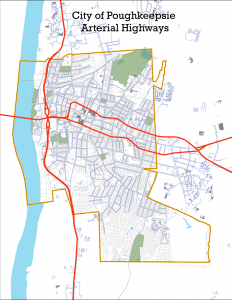In the annual City of Poughkeepsie State of the City address Mayor Rob Rolison called for unity in order to overcome the city’s current woes. This got me thinking about the many ways that the City of Poughkeepsie is divided. There are the obvious political divides, and the divisions between the people who work in Poughkeepsie and those who live there, as well as innumerable other issues that separate its people, but the city has been literally divided by its built environment – more specifically, its highways. One, the Route 9 arterial, built in 1966 divides the city from its waterfront. The other, the east – west arterial, completed in 1979 makes an island of the city’s central business district, and deepened the economic and social divide between the north side and the south side.
The BenCen Blog
Informing Public Discourse in the Hudson Valley and Across the State
Month: April 2017
 Check out Dr. Eve Waltermaurer, The Benjamin Center’s Director of Research and Evaluation, discussing the results of our Women@Work’s View on Women Poll, released just in time for our NYS Women’s Right to Vote Centennial Conference!
Check out Dr. Eve Waltermaurer, The Benjamin Center’s Director of Research and Evaluation, discussing the results of our Women@Work’s View on Women Poll, released just in time for our NYS Women’s Right to Vote Centennial Conference!
Guest post from Despina Williams Parker, Staff Assistant for the SUNY New Paltz Dean of Liberal Arts & Sciences
This article was originally posted in the Liberal Arts & Sciences Spring Newsletter.
At the age of 5, Natassia Velez set her sights on a leadership role even more demanding than kindergarten class line leader. She had the will, the desire and the smarts. But when she boldly announced her intentions to become the president of the United States, she heard not encouragement, but laughter.
As she got older and prominent female politicians like Hillary Clinton emerged, Velez noticed a change in others’ response to her political aspirations. “People started realizing that it was more plausible for a female to be president, so they stopped laughing,” she said.
Now a senior international relations major, Velez enrolled in this spring’s “Women and Politics” course to learn more about the “barriers and pathways” for women like herself who hope to enter the political arena. Her experience so far has been both eye-opening and empowering.
Led by Kathleen Dowley, an associate professor of political science and director of the Women’s, Gender & Sexuality Studies Program, and KT Tobin, associate director of the Benjamin Center and sociology lecturer, the course’s first team-taught iteration offers an expansive look at the cultural, institutional and economic barriers to, as well as the opportunities for, women’s political participation in the U.S and around the globe.
Guest post from Tom Cetrino, a SUNY New Paltz Political Science alum and member of The Benjamin Center’s Advisory Board
Recently enacted legislation (A3009C/S2009C Part BBB) included a revision of Governor Cuomo’s proposal to require each county outside of New York City to prepare a plan for further sharing of service delivery responsibilities among local governments contained within the county. Each county is required to have a shared services panel that must include the chief executive of the county (typically the County Executive) who will serve as the chair, and the mayor or supervisor of every town, city, and village in the county. Additionally, the county may elect to include school districts, BOCES, and special improvement districts on the panel and in the plan.
The plan must demonstrate new recurring property tax savings by eliminating or consolidating duplicative local government services. In preparing the plan, the county must consult and seek input from the shared services panel and each collective bargaining unit with members working for the entities represented on the panel as well as community, business and civic leaders. At least three public hearings must be held on the plan.
Guest post by Glenn Geher, Professor and Chair, Department of Psychology, and Founding Director of the Evolutionary Studies Program, SUNY New Paltz.
My Bronx grandma, Pearl Trilling, was fond of reminding me that experience was often the best teacher. “You’ll really understand Glenn,” Grandma Trilling would say, “when the shoe pinches you.”
My experience through the years has confirmed the observation that people rarely care much about a problem until they are directly affected. When the shoe pinches you, that’s when you care.
To say the least, the shoes Donald Trump is trying to make America wear are pinching lots of people, in lots of place, in lots of ways. Think immigration. Think health care. Think the environment. Elsewhere, I’ve spoken out on all of these issues. But because I work in higher education, I feel the pinch there directly.
A few weeks ago, I was informed about an international boycott on academic conferences in the USA – supported by thousands of academics from all around the world (as reported in Times Higher Education). The abortive executive order banning Muslims from seven nations, among other presidential actions, has led scholars world-wide to organize to take a stand against what is happening in our country. (Thankfully, that order, as well as a more narrowly focused redo, has thus far been stopped in its tracks by the courts.)
Guest post by Amy Nitza, Director of the Institute for Disaster Mental Health
Our national politics today seem to respond only to military and ecological disasters at home and abroad. Epidemiological disasters and bioterrorism and our local and national responses to them – how they’re handled, with what consequences on the physical and mental health on our first response workers, and on our resources – deserves sustained attention. This year’s The Institute for Disaster Mental Health (IDMH) conference, Psychosocial Response to Pandemic Disasters, Infectious Diseases, and Bioterrorism, is an important opportunity for our region to increase its preparedness for this type of emergency.
© 2024 The BenCen Blog
Theme by Anders Noren — Up ↑



